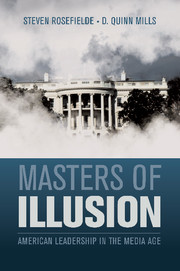Book contents
- Frontmatter
- Contents
- List of Tables and Figures
- Preface
- Acronyms
- Executive Summary
- Acknowledgments
- PART I NATIONAL SECURITY IN THE NEW AGE
- 1 A World Wounded
- 2 Long-Term Economic Realism
- PART II AMERICAN PUBLIC CULTURE AND THE WORLD
- PART III AMERICAN PUBLIC CULTURE AND OURSELVES
- PART IV THE RECONFIGURATION OF NATIONAL WEALTH AND POWER
- PART V VORTEXES OF DANGER
- PART VI THE AMERICAN RESPONSE
- PART VII LEADING TOWARD PEACE
- PART VIII AMERICAN PRESIDENTIAL LEADERSHIP
- Notes
- Glossary
- Bibliography
- Index
2 - Long-Term Economic Realism
Published online by Cambridge University Press: 31 July 2009
- Frontmatter
- Contents
- List of Tables and Figures
- Preface
- Acronyms
- Executive Summary
- Acknowledgments
- PART I NATIONAL SECURITY IN THE NEW AGE
- 1 A World Wounded
- 2 Long-Term Economic Realism
- PART II AMERICAN PUBLIC CULTURE AND THE WORLD
- PART III AMERICAN PUBLIC CULTURE AND OURSELVES
- PART IV THE RECONFIGURATION OF NATIONAL WEALTH AND POWER
- PART V VORTEXES OF DANGER
- PART VI THE AMERICAN RESPONSE
- PART VII LEADING TOWARD PEACE
- PART VIII AMERICAN PRESIDENTIAL LEADERSHIP
- Notes
- Glossary
- Bibliography
- Index
Summary
VORTEXES OF DANGER
World issues are best viewed from the perspective of vortexes of national rivalries, rather than the conventional method focusing on country by country relationships. Conventional analysis and interpretations of international relations are of little use. Nations have interests and rivalries of long standing. Human events are the result of great currents of interest, irrationality, and the will to power. There will always be a struggle among nations and people for power; alliances are temporary and today's friend can be tomorrow's foe; and power politics among the nation's of Europe and Asia are a fact of our world. Applying an objective approach to a framework identifying vortexes where national interests are in conflict best equips a president to lead
A useful example of a long-standing rivalry among nations that are allies has been provided by David Pryce-Jones in his description of French efforts to ally themselves closely with Arab leaders as a counterweight to Anglo-American influence elsewhere in the world. This French policy has its roots in the late eighteenth century and is a continuing theme of French foreign policy which explains much of French opposition to American-led responses to Saddam Hussein's activities, quite independent of any of the controversies of the time, 2003, about Iraqi weapons of mass destruction. As the French pursue this objective in the changing atmosphere of international politics, its fate is determined by economic developments and the quality of their leadership.
- Type
- Chapter
- Information
- Masters of IllusionAmerican Leadership in the Media Age, pp. 18 - 34Publisher: Cambridge University PressPrint publication year: 2006

